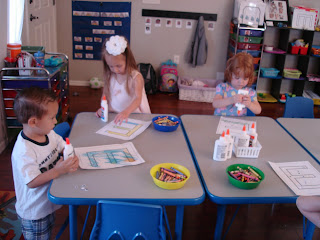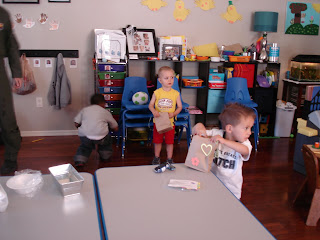
Sight Word: like
Color: Yellow
 |
| Jace and Trynnity coloring their Easter pictures |
 |
| Coloring our Easter pictures |
 |
| Elizabeth |
Cutting Practice- using small strips of scrap paper the kids use their scissors skills to make long, short and simple cuts. When practicing at home be sure to use the kids blunt tip scissors. Also keep in mind that the younger ones are still developing strength in their hand to hold and use the scissors correctly. So be patient and keep PRACTICING opening and closing: )
Easter Egg Decorating- WOW! What fun with colors and "ovals". My friend Anabelle came by with her son Jaxon to help us decorate. I was so thankful for the extra grown up hands! A few of the kids wanted to crack the eggs like they do when we have baking days, but over all they really enjoyed getting their hands "dirty" and watching their egg transition from white to a ray of colors.
The letter E for eyes!
 |
| Add caption |
Math Practice: Addition
 | |||||||||
Paper Mache & Spring Chicks
 | |
Centers:
Imaginary play! Why is this important?
1. Social-Emotional Skills – When children play together, they practice sharing, turn-taking, and negotiating. In addition, children can better understand and manage their feelings by acting out certain experiences. Pretend play also develops children’s ability to empathize, because they have to consider the way others act, think, and feel.
2. Language and Vocabulary Skills – Children have a variety of experiences to share with each other, and when they talk and play together, they are actually teaching and learning new vocabulary. They are improving their language skills when they have to communicate with one another in a clear and effective manner—for example, when they are explaining a story which requires a logical plot and sequence of events.
3. Problem-Solving Skills – Children can come up with complex plans and solve difficult problems as they play. They have to determine who is going to play which role, where the adventure is going to take place, and what events will happen along the way. If a problem arises during their journey, the children have to rethink the story and negotiate a new situation to reach a final goal that is agreed upon by everyone. Pretend play also develops abstract-thinking skills, which are higher-level thinking skills, for example, using a prop, such as a spoon, as a symbol for something else, such as a microphone.
4. Disciplinary Skills – Children practice rules when playing. A girl might put her doll in time-out for not cleaning up a mess she made. The girl is more likely to discipline herself and follow the rules given by others having been a disciplinarian herself.
(Super Duper Publications; Pretend Play)
 |
| Rose having a pretend tea party. |
 |
| Little boys SHARING while playing with trains. |
 |
| Trynnity and Gabe preparing lunch. |
 |
| Elizabeth enjoying the lunch Gabe "made" her |
ABC puzzle match
Animal Cards
Peg Counting/ Stacking/ Sorting
Foam Shape Sort
Puzzles
Easter Sensory Bin
Books
Shape Sorting: Triangles, Squares, Circles
Counting elephants and ordering from smallest to biggest
Easter Celebration:
Making our Easter bags
Finding our eggs!
Miscellaneous:
Lunch time!

Ms. Jaymee's Picture of the Week:
 |
| More of that imagination at work! Israel and Prestton |













































No comments:
Post a Comment